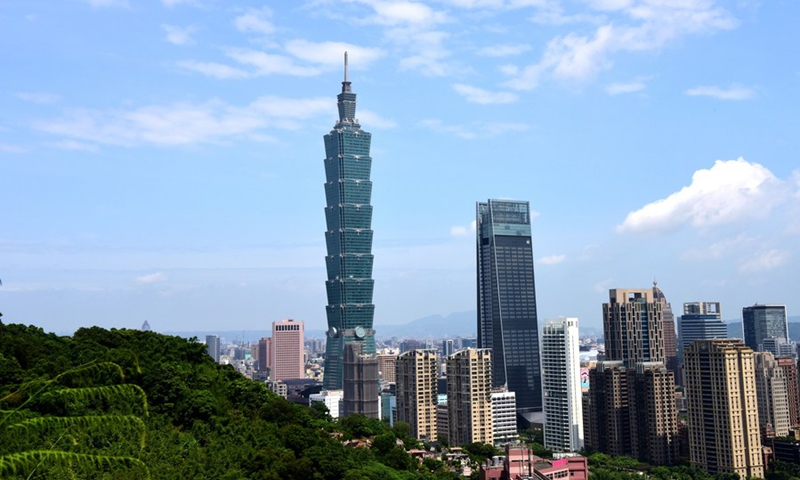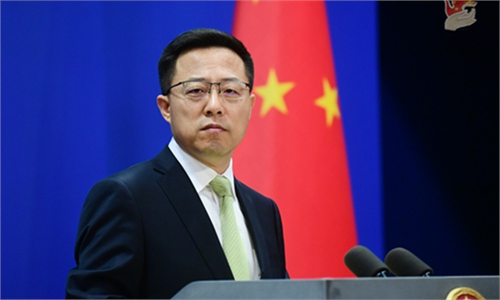Xi draws red line over fundamental issues of ties including Taiwan question in meeting with Biden, warns secessionists of getting burned

Photo taken on July 21, 2019 from Xiangshan Mountain shows the Taipei 101 skyscraper in Taipei, southeast China's Taiwan. (Xinhua/Zhu Xiang)
In a more than three-hour-and-a-half virtual meeting between Chinese President Xi Jinping and US President Joe Biden, the two held in-depth exchanges about strategic, overarching and fundamental issues, which include the Taiwan question, managing differences, and security, sovereignty and development issues.
Despite "rosy" promises from the US on those core issues, Chinese officials and observers believe actions speak louder than words, and hope Washington can put their words into action.
The Chinese President warned the Taiwan authorities' collusion with some in the US is a dangerous trend and will backfire. Meanwhile, the US President promised to stick to the one-China policy and not support Taiwan secessionism.
During their video meeting on Tuesday morning Beijing time, Xi stressed China's stance on Taiwan to his US counterpart.
He noted the new wave of tensions across the Taiwan Straits, and ascribed the tensions to the repeated attempts by the Taiwan authorities to look for US support for their independence agenda as well as the intention of some Americans to use Taiwan to contain China. Such moves are extremely dangerous, just like playing with fire. Whoever plays with fire will get burnt.
The one-China principle and the three China-US Joint Communiqués are the political foundation of China-US relations. Previous US administrations have all made clear commitments on this question. The true status quo of the Taiwan question and what lies at the heart of one China are as follows: there is but one China in the world and Taiwan is part of China, and the Government of the People's Republic of China is the only legal government representing China, said Xi.
Achieving China's complete reunification is an aspiration shared by all sons and daughters of the Chinese nation. We have patience and will strive for the prospect of peaceful reunification with utmost sincerity and efforts. That said, should the separatist forces for Taiwan independence provoke us, force our hands or even cross the red line, we will be compelled to take resolute measures, the Chinese president said.
The US President also stressed that the US government is committed to the one-China policy, does not support Taiwan secessionism and hopes for peace and stability across the Taiwan Straits.
The US does not seek to change China's system, nor seek to enhance an alliance to thwart China, and has no intentions of engaging in conflict with China, President Biden reiterated.
In an interview with the media after the virtual summit, Vice Foreign Minister Xie Feng urged the US to obey formal bilateral pacts reached by China and the US, as well as the formal accords which were passed in UN meetings, to respect the one-China principal held by the majority of countries, and to win credit from Chinese people and international society through actions.
President Xi stressed that a sound and stable China-US relationship is required for advancing the two countries' respective development and for safeguarding a peaceful and stable international environment, including finding effective responses to global challenges such as climate change and the COVID-19 pandemic. China and the US should respect each other, coexist in peace, and pursue win-win cooperation.
President Xi identified priority areas where China and the US should focus their efforts on.
First, shouldering responsibilities of major countries and leading the global response to outstanding challenges, said Xi, noting that China-US cooperation may not solve all problems, but few problems can be solved without China-US cooperation.
President Xi expressed his readiness to stay in touch with President Biden through multiple means to set the direction and inject more momentum into bilateral relations. The two countries, with broad common interests in a wide range of areas including economy, energy, mil-to-mil, law-enforcement, education, science and technology, cyber, environmental protection and sub-national interactions, should complement each other to make the cake bigger for China-US cooperation.
The two sides could fully harness the dialogue channels and mechanisms between their diplomatic and security, economic and financial, and climate change teams, in an effort to advance practical cooperation and resolve specific issues, said Xi.
Third, managing differences and sensitive issues in a constructive way to prevent China-US relations from getting derailed or out of control. It is only natural for the two countries to have differences. The key is to manage them constructively so that they don't magnify or exacerbate.
Xi said that China will certainly defend its sovereignty, security and development interests. It is important that the US properly handle the relevant issues with prudence. Fourth, strengthening coordination and cooperation on major international and regional hotspot issues to provide more public goods to the world. China and the US need to work together with the rest of the international community to defend world peace, promote global development, and safeguard a fair and equitable international order.
Biden agreed that bilateral relations should not break down. The two should respect each other, learn to co-exist and hold candid conversations on issues to ensure a healthy competition, which won't lead to confrontation.
The US President also vowed not to seek a new "Cold War' as every country, including US allies, does not want to go on the old road or pick sides between China and the US.
Drawing ideological lines or dividing the world into different camps or rival groups will only make the world suffer. The bitter lessons of the Cold War are still fresh in memory. We hope that the US side can meet its word of not seeking a "new Cold War" with concrete actions, said Xi.

